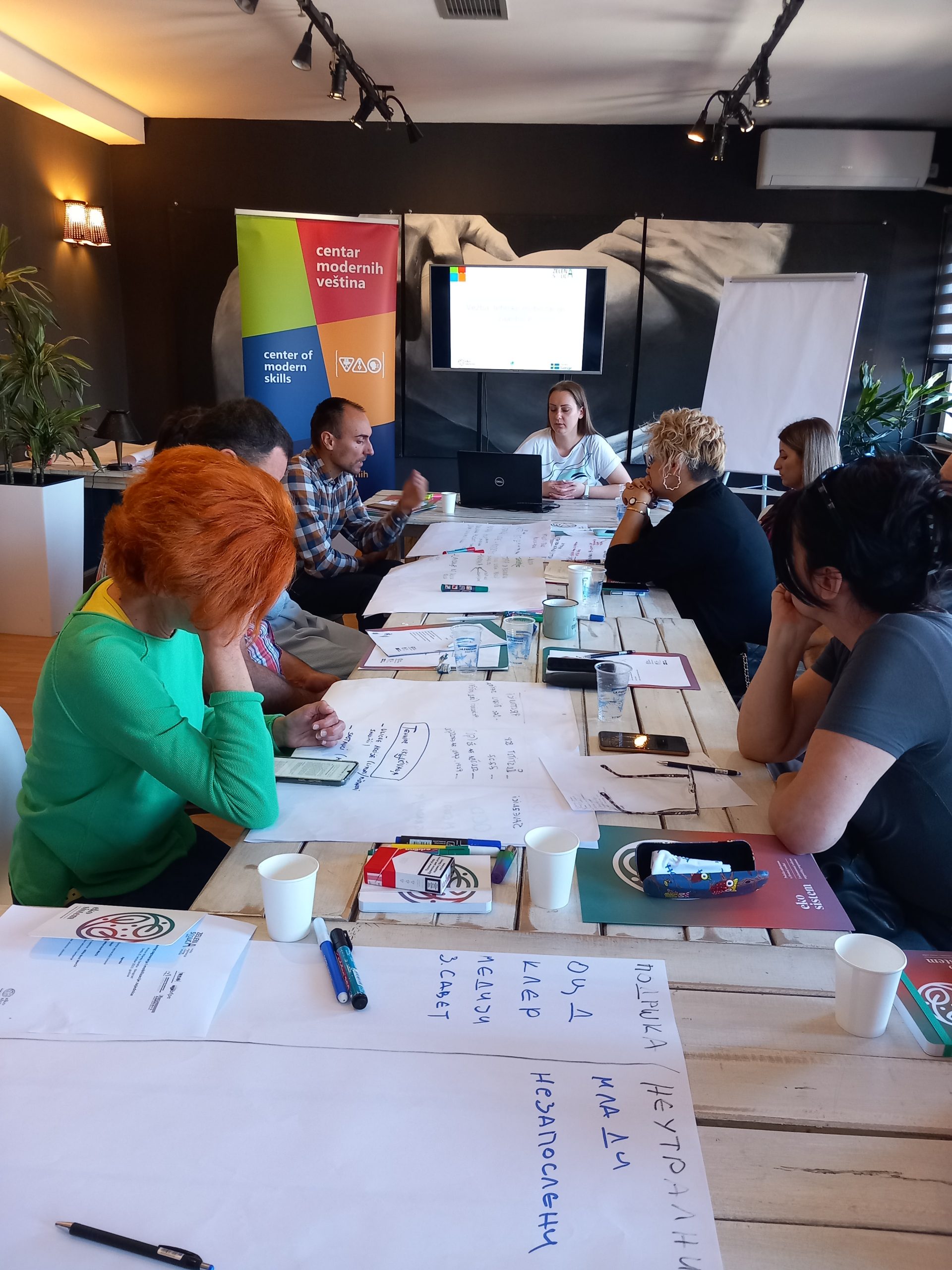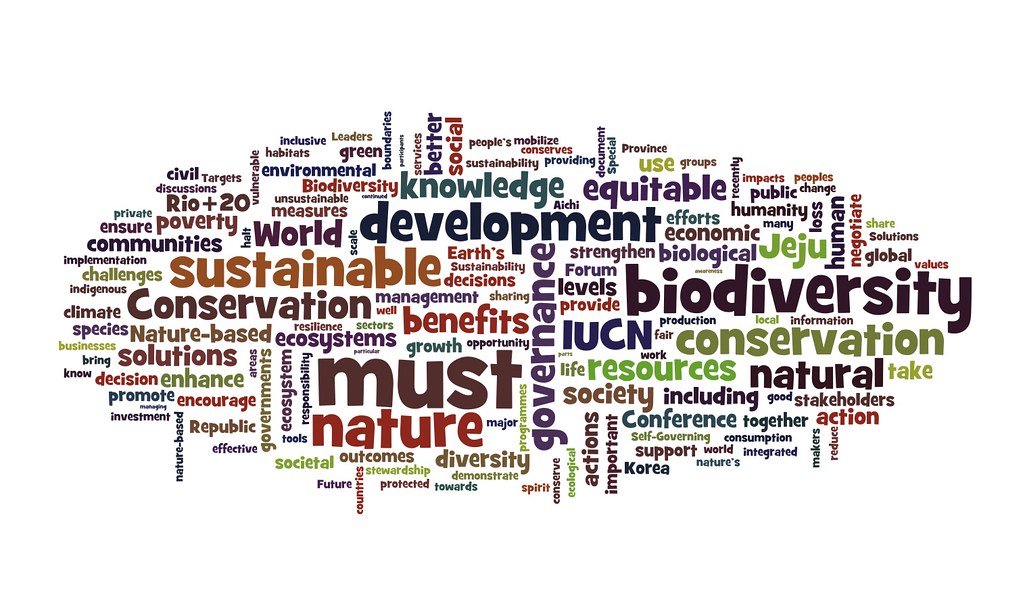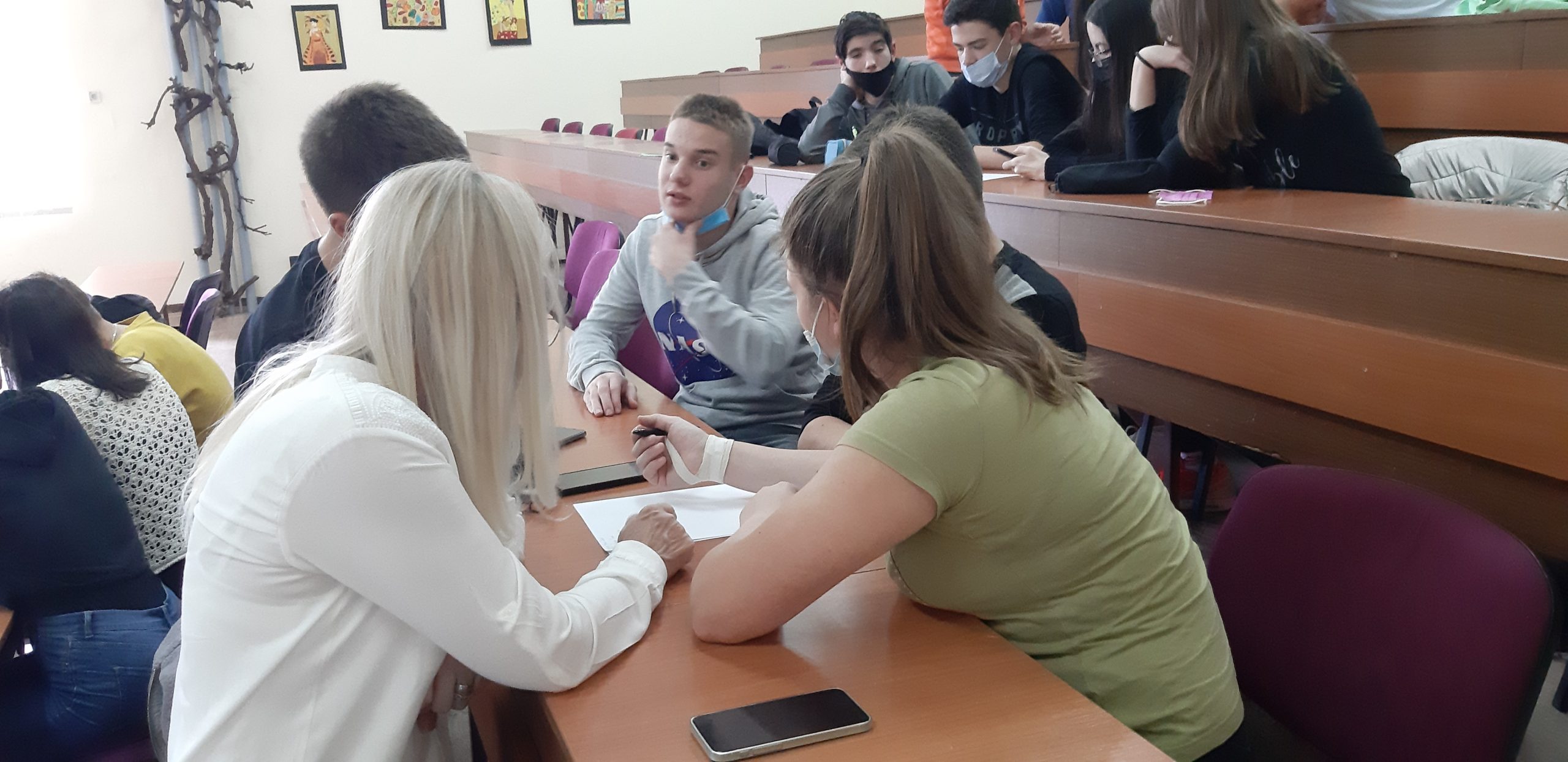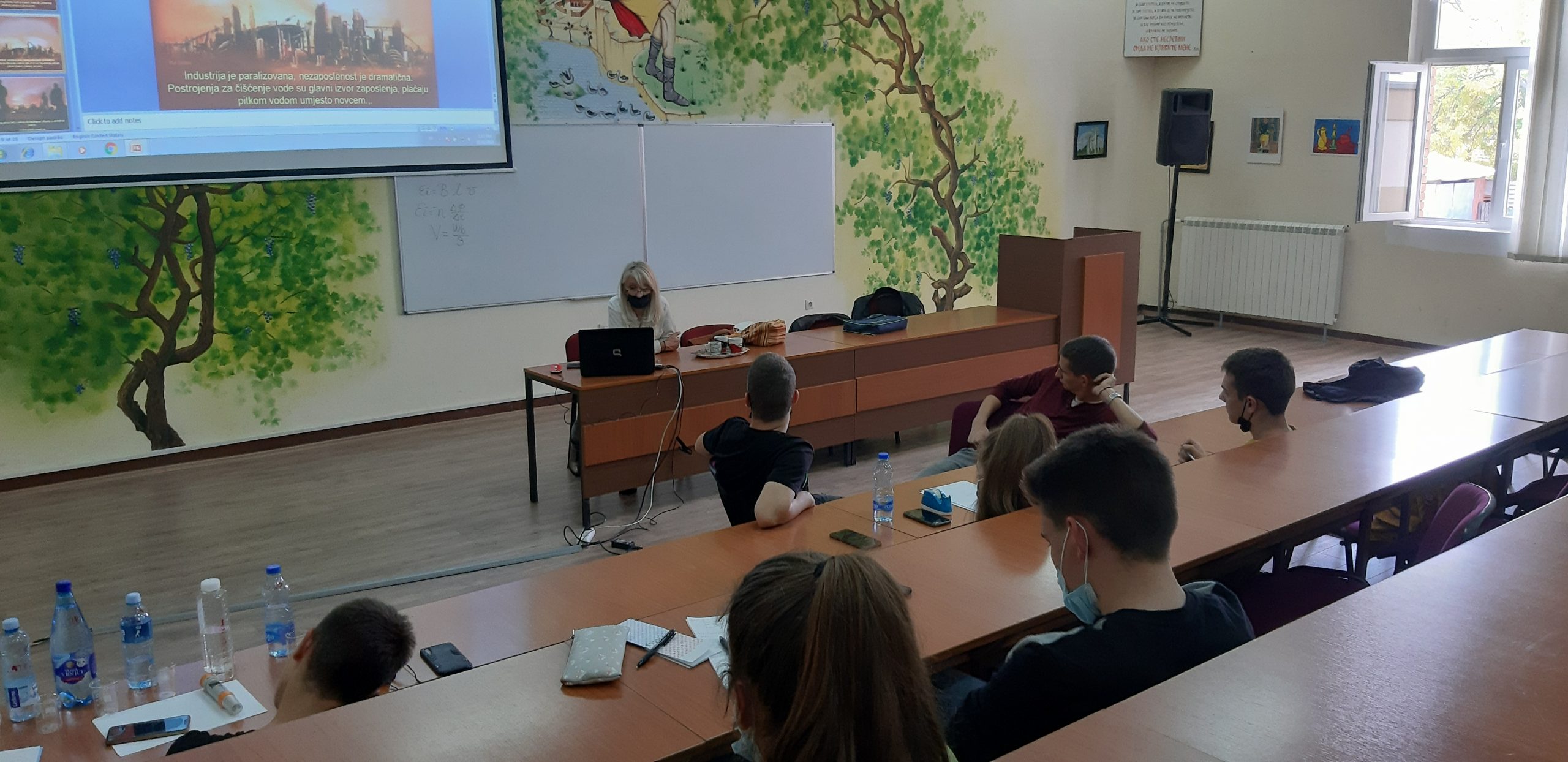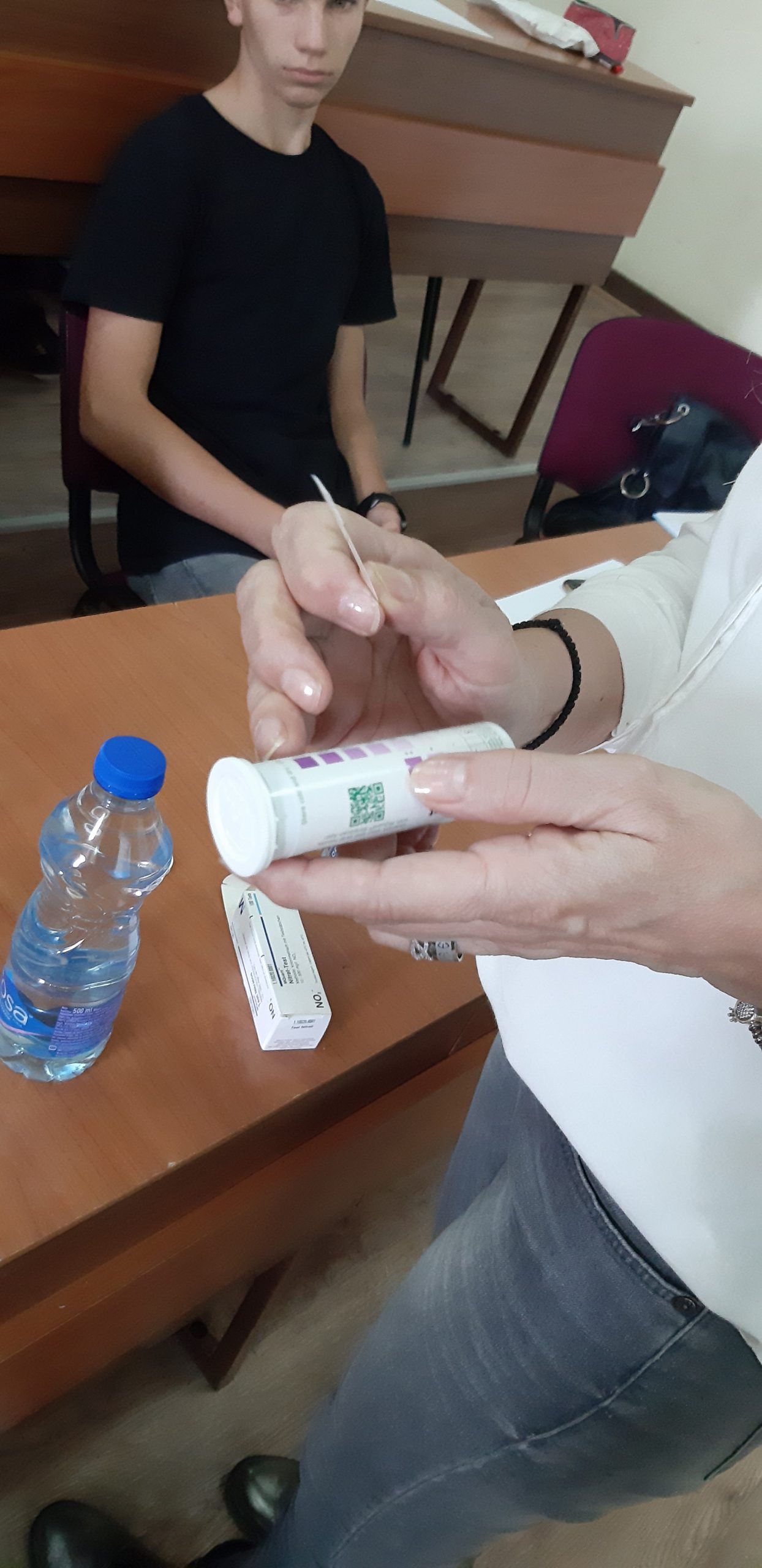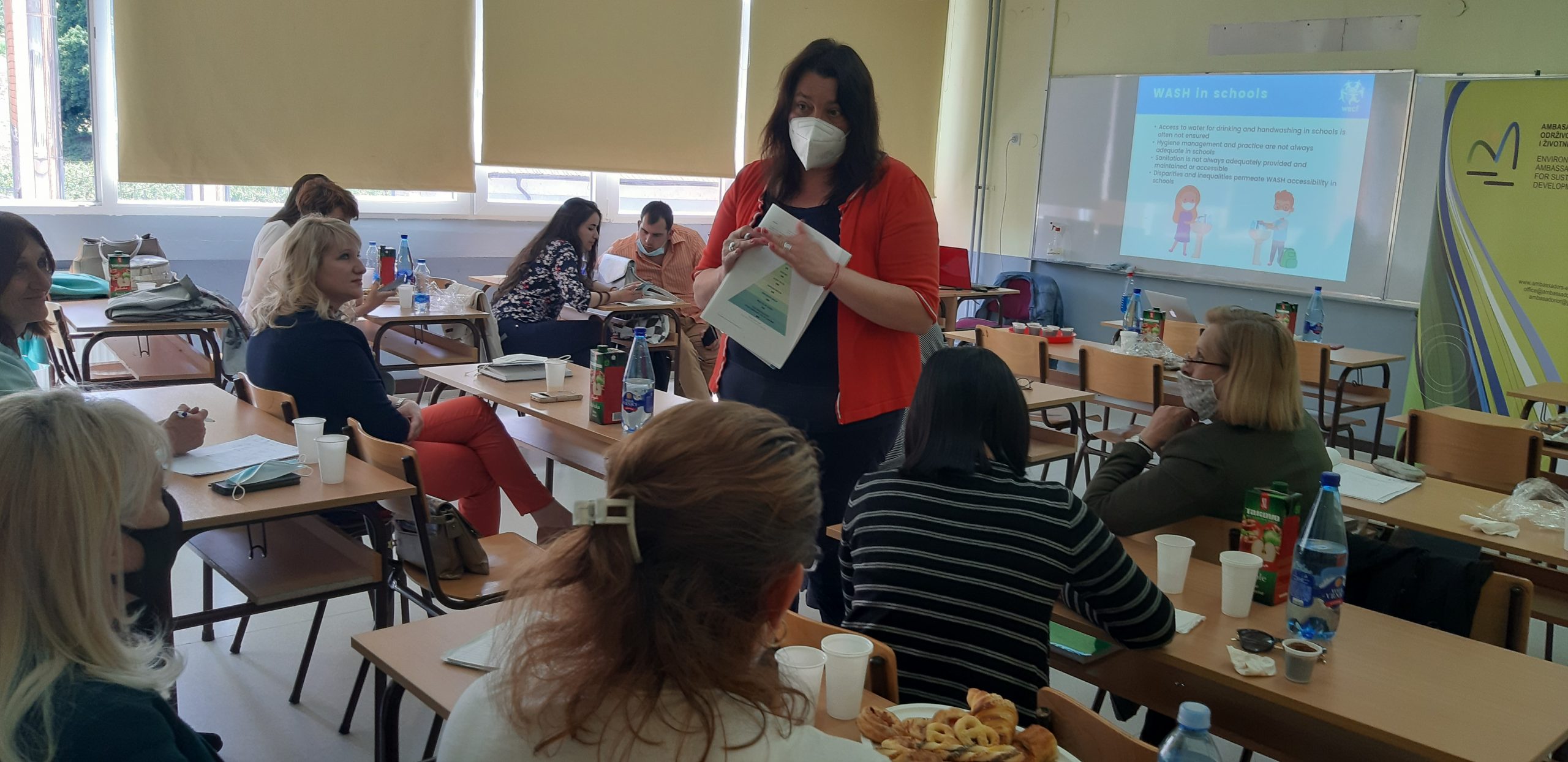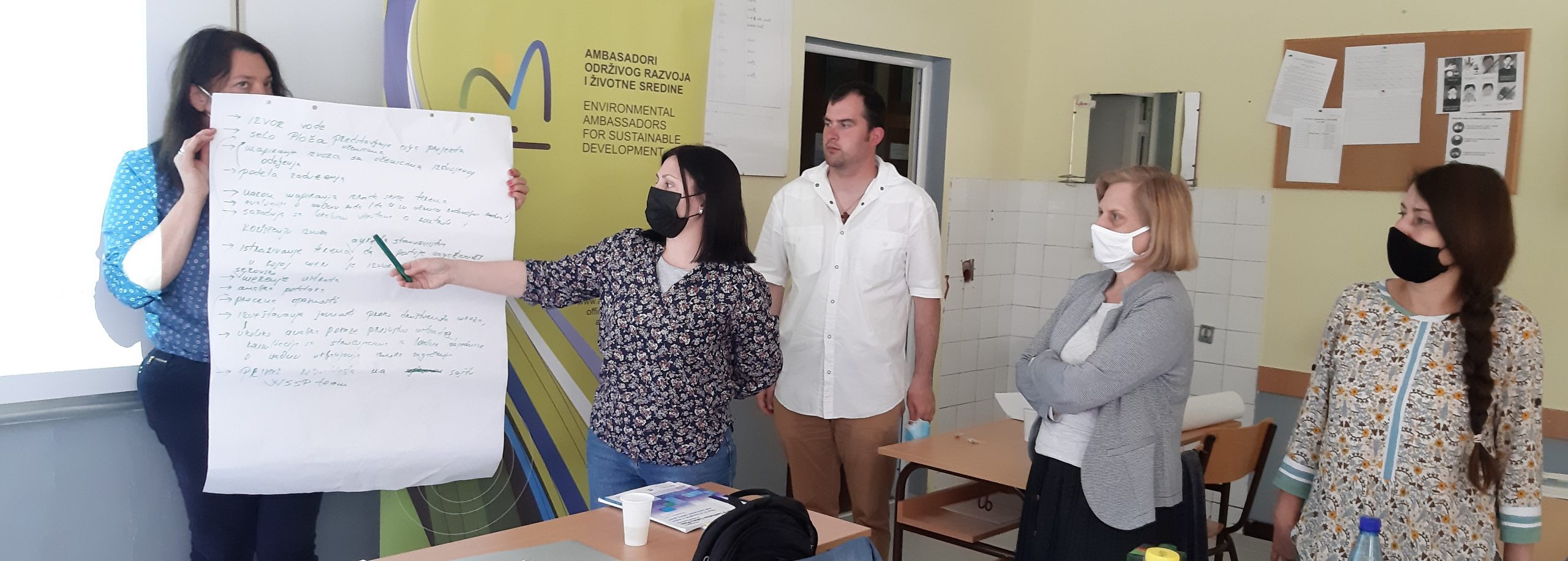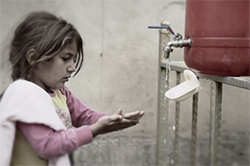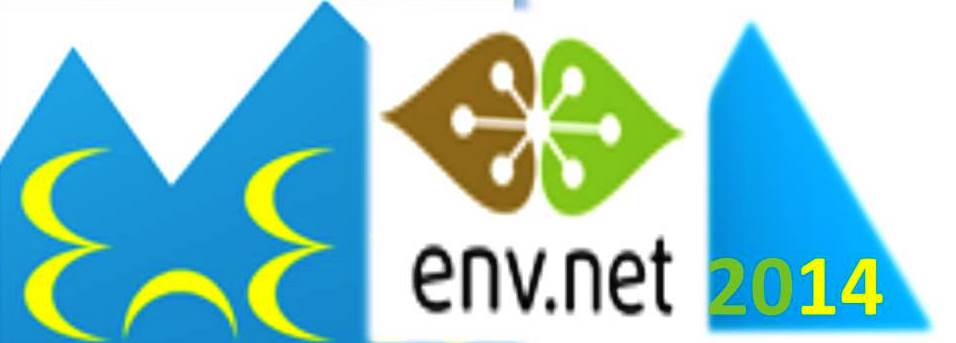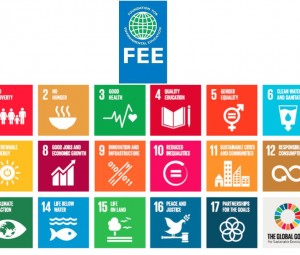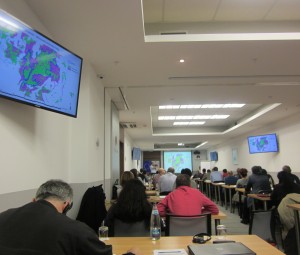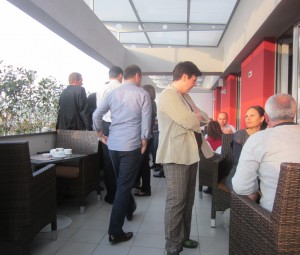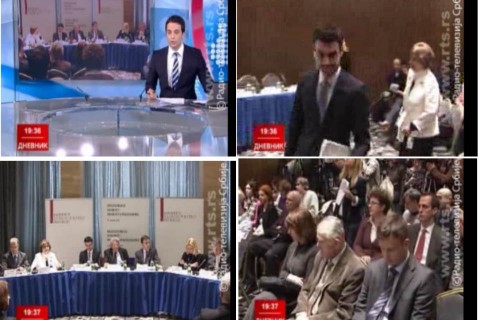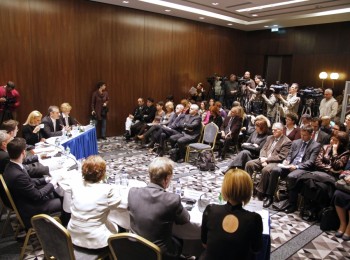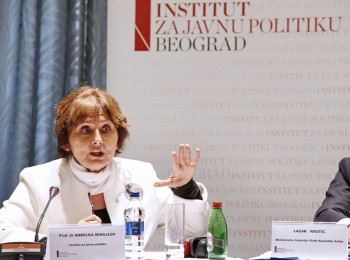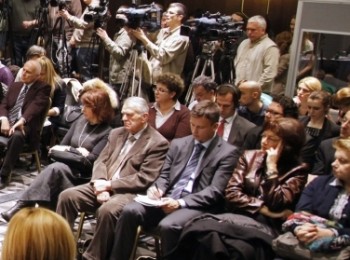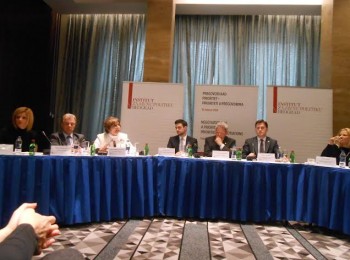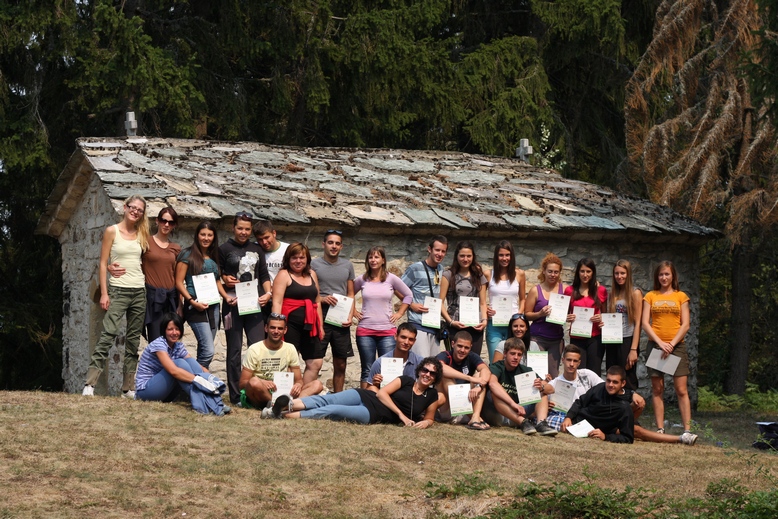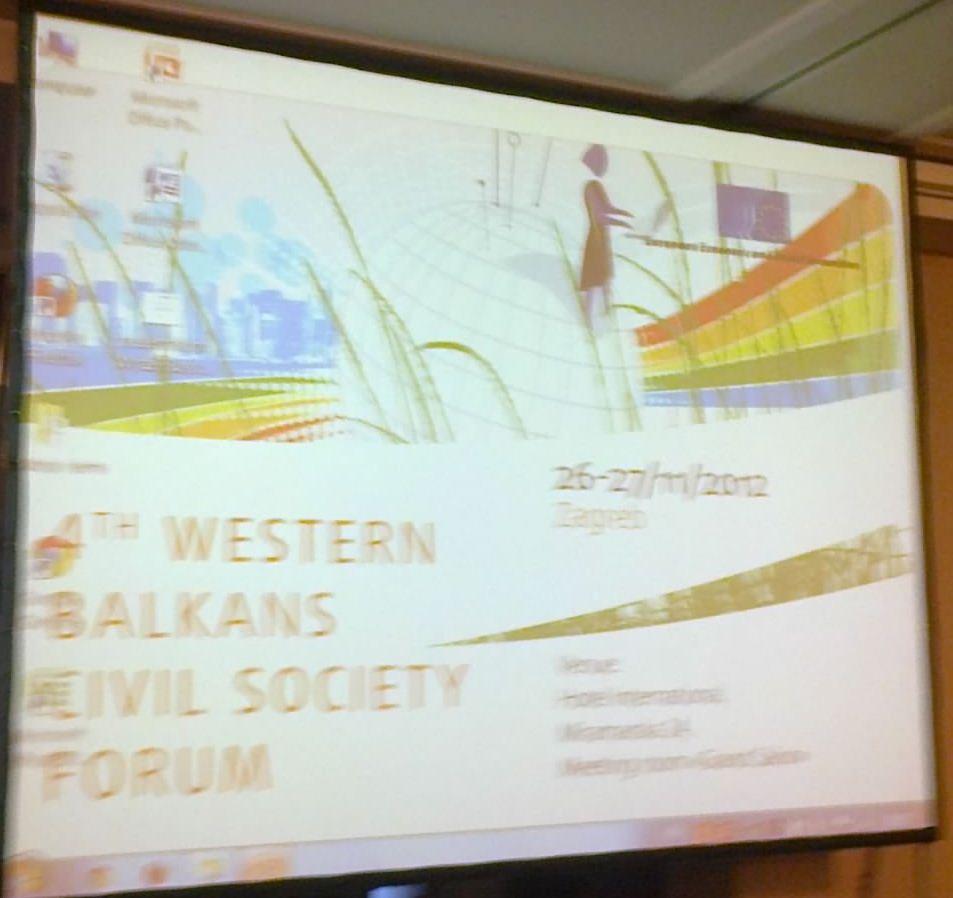ECO-SYSTEM AND “GREEN CHAIR”: PROJECT “CITIES READY FOR CLIMATE CHANGE”
Consultations and a workshop for the preparation of the proposal of the Strategic Plan of the “Green Chair” network were organized within the third cycle of the EKO-SYSTEM support program “Cities Ready for Climate Change”, in October 2023. The lead partner is the Centre for Modern Skills, and the partners are the Aarhus Centre Novi Sad, the BFPE Foundation for Responsible Society and the Environmental Ambassadors for Sustainable Development. The project aimed to improve further the work and strengthen the “Green Chair” network. The topic of the project is adaptation to climate change at the local level.
During the implementation of the project, another activity was consultations held with representatives of local communities: Kruševac, Pirot, Požega, Sremska Mitrovica and Subotica, to encourage advocacy at the local level, related to climate change.
The representative of the Environmental Ambassadors for Sustainable Development, Aleksandra Mladenovic, supported the preparation of a model of a local initiative for the city of Kruševac, which contains measures to mitigate climate change at the local level. As part of the mentoring work, two online thematic meetings were held, with the team for drafting a local initiative. It includes the concept of measures that will be proposed to the local self-government unit. The mentoring work resulted in greater cohesion of the local team, strengthening mutual communication and reaching an agreement on joint climate action at the local level.
Proposal of measures and recommendations for adaptation to climate change and mitigation of the impact of climate change, for local self-government units
General Measures
1. Include a set of measures and recommendations for adaptation to climate change in the development of spatial planning and strategic documents, Development Plans, and Local Environmental Action Plans.
2. Building, strengthening and improving capacities at the municipal level to a) adapt to climate change to introduce adequate measures into policies and decision-making processes at the local level, b) plan and implementation of climate policies, as well as modeling GHG emissions at the local level, and c) data collection, analysis and use (with a focus on the use of GIS), especially those related to river basins, flood maps, water source protection zones, erosion risk zones, etc.
3. Organizing trainings and seminars on available funds for the implementation of projects directly related to climate change (renewable sources, energy efficiency), joint training and seminars to strengthen institutional capacities and improve multisectoral cooperation.
4. Preparation of educational manuals to improve the understanding of the vulnerability of certain sectors to the impacts of climate change and to build resilience and adaptive capacity of the local community.
5. In cooperation with higher levels of government, strengthen the capacities (technical and human) of protection and rescue services at the local level to undertake organized and effective protection and rescue measures.
6. Establishment of an early warning system for the management of extreme climatic events (for all types of climate hazards: floods, droughts, landslides, forest fires, etc.).
7. Use of digital technologies to monitor extreme climatological situations (e.g. drone monitoring, real-time monitoring, etc.).
8. Establish a single database on droughts, floods and landslides and their damage.
9. Adapt Local Fire Protection Plans in the context of adaptation to climate change; ensure reserve amounts of water, by building or installing water tanks, etc. for effective fire protection (especially in open spaces).
Measures by sector
– Agriculture
1. To improve the knowledge of farmers about the impacts of climate change and to introduce them to examples of good practice from the countries of the European Union, but also from the surrounding countries.
2. In organized agricultural production, establish a hail protection system.
3. Improve irrigation infrastructure and ensure sufficient water for irrigation of arable land, in particular for agricultural production that takes place outdoors and is therefore exposed to weather conditions.
4. Receive and capsulate large waters when they exist and make them available in conditions of need through the construction of artificial reservoirs, which, in addition to the production of electricity, also create conditions for the development of tourism, provide flood protection of the downstream area and provides water for irrigation.
5. Implement measures to improve cooling in agriculture (construction of shelter from the sun, adequate accommodation, installation of fans and sprinklers).
6. Subsidize small agricultural producers, especially in the context of reduced incomes and agricultural yields during dry periods.
7. In agriculture, encourage the use of adequate varieties that are more tolerant to heat and drought, change crop patterns, target land management practices, farm structure, and adaptive capacity of farmers.
8. Application of measures aimed at preventing plant diseases, soil heating, etc.
9. Create the conditions and strengthen the awareness of farmers for adequate management of agricultural waste to reduce emissions from methane.
– Forestry
1. Maximize illegal logging control and implement forest health protection measures (occurrence of pathogenic fungi, occurrence of forest fires, define measures in response to snowstorms, wind gusts, frosts, etc.).
2. Intensify afforestation in landslide-prone areas and land erosion to reduce the risk of new landslides.
3. Establish comprehensive monitoring of areas at risk of erosion and landslides, with the preparation of plans and maps and action plans for prevention and control over their implementation.
– Civil engineering
1. To reduce the risk of landslides, establish continuous monitoring and documentation of illegal and unplanned construction of residential and other buildings and consistently implement regulations governing construction conditions.
– Water management
1. Plan the construction of a system for connection to the sewage network and wastewater treatment plants
2. Provide for continued investment in preventive protection and rescue measures, as well as full coordination with all actors having an impact on floods.
3. Procurement of adequate material and technical means and equipment is important for the provision and organization of all measures that affect the degree of vulnerability of people and material goods from floods.
4. To ensure timely and complete information to citizens about all measures and actions taken by the municipality to reduce the risk of floods, as well as to raise awareness of citizens about the possible consequences of floods.
5. Establishment of uniform inter-municipal and regional flood protection measures and a unified system of warning and notifying the competent structures of the upcoming danger, as well as the need to build a common (single) management system for hydropower facilities that have a regional character.
– Nature protection
1. Application of Nature Based Solutions, such as the maintenance and restoration of natural aquatic ecosystems (e.g. rivers, connecting river channels and meanders), afforestation, restoration and maintenance of grasslands, buffer zones, adequate land management, etc., because nature-based measures are more effective than technical infrastructure for flood protection (embankments, canals, etc.), both in environmental and economic terms.
– Waste management
1. Implement measures to reduce the waste that is deposited and adequate collection of municipal waste (collection networks in rural areas, construction of recycling yards, procurement of specialized equipment for waste collection, as well as activities to educate and raise awareness among the local population about the importance of this topic).
-Gender equality and human rights
1. At the local level, work on linking gender equality and climate change, as well as the realization of equal rights for all, especially vulnerable groups (e.g., youth, Roma, women, persons with special needs…), by implementing climate change mitigation measures.
Biodiversity protection and nature-based solutions in focus of EASD activities
Concept of nature-based solutions implies searching for existing, sustainable solutions from nature in order to provide benefits for both human well-being and biodiversity, by addressing societal challenges. There are different solutions mapped so far and implemented in different areas and environments, such as protection, restoration or management of natural and semi-natural ecosystems; the sustainable management of aquatic systems and working lands such as croplands or timberlands; or the creation of novel ecosystems in and around cities. All solutions are designed to be implemented by local communities and related institutions and organizations (towards implementation of United Nations Decade of Ecosystem Restoration 2021-2030)
EU Biodiversity Strategy to 2030, represents a comprehensive plan under the European Green Deal, which serves to improve state of the nature in European Union, by protecting biodiversity and reversing the degradation of ecosystems. In the focus of this Strategy is increasing the area under protection for at least 30% of both land and sea in Europe, restoring degraded ecosystems and securing 20 billion EUR/year for biodiversity through various sources, including EU funds, national and private funding.
The main challenge in the region of Western Balkan, area with outstanding biodiversity, natural resources and huge number of solutions created by nature, is to set up Green Agenda and Biodiversity for the Western Balkans as important as all other Development Agendas. In 2017, the Biodiversity Task Force of South East Europe was established to serve as a technical and advisory body of the Regional Working Group on Environment (RWG Env) of the Regional Cooperation Council. The most important objective for Western Balkans in Green Agenda implementation is to mainstream biodiversity elements in other policy areas in order to improve state of protected areas (through sustainable financing), increase number of protected areas and increased surface area under protection, as well as to improve the status of the endangered species. In addition, these actions will lead to protect, restore and manage natural and semi-natural ecosystems; to establish sustainable management of aquatic systems and working lands, but also will provide different solutions and possibilities for creation of novel ecosystems in and around cities. The strategic Green Agenda for WB document will identify priorities to focus on, while the implementation would require synchronized actions and involvement of the entire region, by strengthening regional cooperation and involvement of all relevant institutions and organizations, in order to promote and implement nature-based solutions.
Biodiversity and nature protection are among EASD priorities in last ten years, reflecting in conference proceedings[1][2] , contribution to Study on Achievements and Perspectives towards a Green Economy and Sustainable Growth in Serbia, or training providing on ecological footprint. One of the priorities of EASD focus is education on importance of biodiversity protection, which is implemented mainly through the Eco-schools Serbia network. In the period 2017-2020, under the project The Great Plant Hunt biodiversity topic is introduced in Eco-schools Serbia network and started with implementation of the nature-based solutions concept.
From February 2022, EASD started to implement within Eco-schools Serbia network an Erasmus+ project ForLife , with leading partner from Slovenia, and another partner from Italy. This project is directly connected to nature-based solution concept, by using positive examples from nature, regarding promotion of protection, restoration or management of natural and semi-natural ecosystems and in the same time creation of novel ecosystems in urban and sub-urban areas where Eco-schools belong to.
BE CONNECTED WITH THE REGIONAL UNECE FORUM ON SUSTAINABLE DEVELOPMENT
Register to participate on Side Event: https://regionalforum.unece.org/events/adequate-and-qualitative-education-young-people-continues-spite-covid-19
The Regional Forum on Sustainable Development for the United Nations Economic Commission for Europe (UNECE) Region will be held in Geneva on 6 and 7 April 2022 as a hybrid meeting with the theme: Building back better from the coronavirus disease (COVID-19) while advancing the full implementation of the 2030 Agenda for Sustainable Development in the UNECE Region.
Environmental Ambassadors for Sustainable Development will participate in the RFSD and within the Side Event, together with their partners, will present the results of a year of work on the project: “Water and Sanitation Safety Planning in the Balkan Region: Albania, North Macedonia, Romania and Serbia (WatSanPlan)”. All the results concerning education on the topic of WASH and MHM (Menstrual Health Management) in the Balkan region will be presented, demonstrating the needs and opportunities to connect with local CSOs, women groups, decision makers, water supply and sanitation companies, public authorities, and schools/knowledge institutions in peri urban and rural areas in the region. In addition will also be presented how was promoted and built capacity on Water and Sanitation Safety Planning in terms of a developed Compendium, an online learning platform “Water Classroom“ and further on-going educational activities in the Balkan region.
All the activities are based on WASH (Water, Sanitation, Hygiene) and WHO (World Health Organization) programmes related to improvement of the water and sanitation facilities, especially in schools, which represent the joint achievements of the project and the experience gathered by WECF and its partners’ network.
Agenda of the Side Event is available HERE.
More details on the Regional Forum are available at: https://regionalforum.unece.org/events/regional-forum-2022
TRAINING FOR STUDENTS – ALEKSANDROVAC, OCTOBER 22, 2021
Training for students in the frame of the project “Water and Sanitation Safety Planning in Romania, Albania, North Macedonia and Serbia (WatSanPlan)”, Funded by the Federal Ministry for Environment, Nature Conservation and Nuclear Safety, was held on October 22, 2021 in Aleksandrovac. There were 19 participants from different classes of the secondary school and four teacher who passed training for trainers held in June 2021. The training was held at the premises of the Secondary school in Aleksandrovac. The names of participants are not collected, taking into account data protection of minor students (ages 16-17).
Purpose of training: Increasing the knowledge of participants on the Water and Sanitation Safety Plan (WSSP), on the role of WSSP and how to carry out a WSSP in their rural and semi-urban communities.
Before the training, consultation with teachers was held, in order to be prepared to participate actively in presentation and practical work with students. First part of the training was theoretical, where key words are explained (water safety, sanitation, water supply system, waste waters system…). The discussion and practical work started with mapping local community regarding available waters. Participants were divided into four groups: upper Župa, lower Župa, city center and city center surrounding. During the mapping, discussion was launched regarding the current situation on water in the municipality, from the students perspectives. The main findings are:
- students are very well informed and have sufficient knowledge about the situation regarding water and sanitation in own community
- students are also very interested to take part in any future activities in order to improve situation in the municipality regarding water safety and sanitation
- they are coming from different parts of municipality and well know the situation in the parts where they are living
- they shown very well knowledge also regarding the situation not only in Aleksandrovac municipality, but also they are interested what is going on in wider area (such is construction of Morava corridor, which affects Morava river basin, etc.)
- during this training, development of the Plan for water safety and sanitation started to be developed, one student is proposed and accepted to be a leader of the water group (Uroš Jović), two teachers will be also involved as mentors: Maja Stošić and Dragana Bogojević
- regarding the factory for the treatment of wastewaters from the municipality, which was planned to be built in the village Novaci, construction still does not started, because some of the administrative problems
- lack of the wastewater treatment is the main problem of this municipality, according to students opinion
- as practical exercise, students measured water quality from several water bodies, by nitrate tests and pH-meter
- next step is organization of the first official meeting of school water group, to discuss continuation of development of the Plan for water safety and sanitation for Aleksandrovac municipality
Training for trainers on water safety and sanitation
Within the project “ Water and Sanitation Safety Planning in the Balkan Region: Albania, North Macedonia, Romania and Serbia (WatSanPlan), FKZ 16EXI4004A, Förderprogramm „Exportinitiative grüner und nachhaltiger (Umwelt-) Infrastruktur“ BMU, the first training for teachers of the Eco-school was held in Aleksandrovac. During the two-day training, teachers from primary schools, secondary school and educators from pre-school were introduced to the possibilities provided by the development of a plan for water safety and sanitation, with special reference to the situation in rural communities. In addition to the theoretical work presented by Bistra Mihajlova, a project coordinator on behalf of project leading organization “Women engage for a common future” (WECF) from Germany, participants had the opportunity to exchange their own experiences related to water safety and sanitation in rural areas, where there are many field-departments of Aleksandrovac schools. The topic of menstrual hygiene and how girls and young women are educated in the current conditions was also raised, with general comments that this topic is still taboo in our area and that little attention is generally paid to this topic, through regular curricular and extracurricular activities.
Representatives of one of the partners in the project from North Macedonia, “Journalists for Human Rights”, Nataša Dokovska and Aleksandra, were guest lecturers, who shared their experiences in many years of struggle related to water safety, sanitation, menstrual hygiene and menstrual health. According to research that has been conducted in North Macedonia, Nataša Dokovska pointed out that almost 30% of women in this country cannot afford menstrual products. In North Macedonia, as it is situation in Serbia, they face insufficient education on this topic and an unwillingness to accept it as something that is biologically normal and impossible to pretend not to exist. Among other things, their association advocates that menstrual hygiene be spoken in a gender-neutral language, instead of “products for female hygiene “to be named as “menstrual products”. It is a problem in general that almost 80% of girls know about the menstrual cycle in communication with friends or older sisters in the family, and less often from their mothers or through the education system. The biggest problem in schools is practically that there are no basic sanitary conditions to help girls and women during the menstrual period, so, according to research „Journalist for Human Rights“ realized, in rural areas girls are forced to stay at home during menstruation and to miss classes.
Discussion among teachers from the Eco-schools in Aleksandrovac, there are no such bad experiences in this municipality. However, the positive sign is that through the biology curriculum for the 6th grade, the topic of the menstrual cycle is dealt with, in which boys and girls participate equally.
So far, no more detailed research on menstrual health and menstrual hygiene has been done in Serbia, except sporadic articles in the media and initiatives from the University that can be found. Under this WatSanPlan project, the initial research related to menstrual hygiene and menstrual health will be realized through the Eco-schools program during the school year 2021/2022. The results will show a general observation of water safety, sanitation and menstrual hygiene, which will enable further research and launch advocacy campaigns towards decision makers, primarily related to the availability of menstrual products for free in selected Eco-schools.
The next activity on the project will be training for Eco-schools students on water safety and sanitation in rural communities.
The project “Water and Sanitation Safety Planning in the Balkan Region: Albania, North Macedonia, Romania and Serbia (WatSanPlan)” is supported by the German Federal Ministry for the Environment, Nature Conservation, Building and Nuclear Safety and the European Union. The project is managed by the international organization “Women Engage for a Common Future”. In addition to the Environmental Ambassadors for Sustainable Development from Serbia, the project also includes civil society organizations from North Macedonia, Albania and Romania.
WatSanPlan
WatSanPlan (Water and Sanitation Safety Planning in the Balkan Region: Albania, North Macedonia, Romania and Serbia ). In cooperation with WECF, EASD is promoting WSSP in Serbia, through extension and revision of the WSSP compendium, WSSP educational materials & concepts, improve qualification of teachers and students in a Serbian community, conduct media campaign to motivate citizens to measure nitrate levels in water on their own, conduct relevant analysis and publication of results. The actions include public actions by students and teachers on the selected UN World Days, presentation of the project at the Regional Forum on Sustainable Development of the UNECE (Economic Commission for Europe) in Geneva (Switzerland, March 2022), and in Berlin for BMU and other interested parties. All partners should get to know each other, tasks and responsibilities will be discussed in detail and assigned to individual persons. Milieukontakt Albania (MA) and Environmental Ambassadors for Sustainable Development (EASD) will be officially included in the Balkan WASH network.
Project is supported by funds from the Germen Federal Ministry for the Environment, Nature Conservation and Nuclear Safety (BMU). EASD signed contract with Women Engage for a Common Future – WECF e.V., Germany. The timeframe of the project is from 01 September 2020 to 31 August 2022.
____________________
EASD is at World Water Week ( Stockholm 2022)
UNEP@50 and World Environment Day
Joining the World menstrual hygiene day 2022; Reflection
BE CONNECTED WITH THE REGIONAL UNECE FORUM ON SUSTAINABLE DEVELOPMENT
Link for Survey : SVETSKI DAN TOALETA 2021. GODINE – Učestvujte u istraživanju koliko su održivi načini tretmana otpadnih voda iz (Eko)škola u Srbiji –
TRAINING FOR STUDENTS – ALEKSANDROVAC, OCTOBER 22, 2021
Training for trainers on water safety and sanitation
(Razvoj plana za bezbednost vodosnabdevanja i sanitacije u ruralnoj zajednici )
Information paper on Climate Change and Floods
Promotion by media (in Serbian, Da li smo spremni za sve češće poplave? )
Promotion in schools (in Serbian, Kako smanjiti i sprečiti širenje infektivnih bolesti u školama )
ENVIRONMENT TO EUROPE – EnE
This project/process present different phases towards European values, as well as globally values promoted through Multilateral Environmental Agreements. Started to raise awareness of the importance of the UNECE Ministerial “Environment for Europe” Belgrade 2007 Conference, and further continuously is mobilizing interesting parties in Serbia and Region to catalyze environmental and sustainable development.
Within “Environment to Europe” Process, EASD actively participate and organize different supporting activities in different related thematic areas, like sustainable consumption and production, efficient resource use, chemicals, eco-consumers protection, participation at global, EC, regional and with papers at different conferences, etc. Regional cohesion projects supported Environment to Europe process.
__________________________________________________
EEB 2022 ANNUAL CONFERENCE – “Boosting the Deal for a Greener Europe in Turbulent Times”
Study visit to Grenoble – the Green Capital of Europe
EnE22, June 2022 – UNEP@50 and World Environment Day
December 2021 – Climate Pact for Serbia: Snapshot targeted rehearsal of country’s obligations in climate action….
Virtual tour on the experience from Italian practices in circular economy
Recap the moments from EnE19/ENV.net Conference
WEBINAR – Regional Forum of Sustainable Development (RFSD) for the UNECE Region : we participate
EASD full member in European Environmental Bureau – honor and challenge
The ESDN Conference 2018 – we participate ; We participate – ESDN Conference 2018, “Stakeholder-Policy Cooperation in the Age of the SDGs: What new approaches are required to be successful?”, Vienna (Austria), 1-2 October, 2018
Join us for June 5th: Conference Agenda is available
6th UN regional meeting on SAICM, Poland, February 2018: we participate
February 2018: Call for participation for EnE18: Nature protection – Nature-Responsive Development
February 2018: ENV.net 3 Kick-off Meeting in Tirana
November 2017: EASD participate: Summit to Plan the End of Amalgam in Europe 2017– November 20-21, Berlin
September 2017: “Make Mercury History” – EASD participated at Minamata COP1 in Geneva
July 2017: Civil Society Forum in Trieste, 11-12 July 2017 – we (EASD) participate ; Good signal: Serbia gets (again) separate Ministry of environmental protection
June 2017: Climate Change Education for Sustainable Development
April 2017: Call: The Thirteenth Regional Conference ”Environment to Europe – EnE17″, June 5th 2017, Belgrade
February 2017: “EnE17 – The 13th Regional Conference Environment to Europe” announcement: Climate Change Education
June 2016: Agenda , EnE16-ENV.net Zbornik radova/Proceedings of papers ; WED Messages from Serbia: 12th Regional Conference “Environment to Europe” , REPORT FROM EnE16-ENV.net, BELGRADE, SERBIA
January 2016 – Save the date and participate: June 6, 2016 – Environment to Europe Conference
June 5, 2015 – 2015 Conference, Information, Proc. of papers
We participate at European Green Week
December 2014 – Thematic Publication “Environment to Europe” ( Tematski zbornik radova “Životna sredina ka Evropi”)
June 5, 2014 – ENV.net multi-stakeholder Conference on Chapter 27: about 200 participants , 2014 Conference
Agenda for EnE14/ENV.net Conference “Environment to Europe”, June 5, 2014 in SCC – opening at 10:00
Invitation for EnE14-ENV.net Conference, June 5 – 2014 in Belgrade
EnE14 / ENV.net Conference will be held on June 5, 2014 in Belgrade (it will 10th regional conference!). Thematic focus: Chapter 27. Reserve the date! More information soon. Follow the updated information related to event.
__________________________________________________
EnE13 – Environment to Europe Conference on June 10, 2013 is focused on local environment. The main messages from this participatory ENV.net event are: environmental sector activities should be knowledge based, and education for environment and sustainable development should be priority. Capacities and continuity is very important for inclusion environment in other sectoral policies. Conference is institutionally supported by Ministry of Energy, Development and Environmental Protection and Ministry of Natural Resources, Mining and Spatial Planning, as well as National Commission for UNESCO. This Conference is UNEP WED event.
| 2013 | EnE13 | ENV.net Roundtable Focus: Local Environment | Agenda, Zbornik radova EnE13 – Zivotna sredina ka Evropi – Papers Proceedings; Minutes; More than 120 participants at EnE13 conference/ENV.net Roundtable: 10 June, 2013 in Belgrade |
Snapshots from the previous EnE “Environment to Europe” Conferences:
| Thematic focus | Published materials | ||
| 2005 | EnE05 | Thematic focus : The importance of Environmental Sector in EU Integration process | Detailed Agenda published.CD Proceedings of Papers published. Book “Sustainable Development and Environment towards Europe in 95+ steps”, by A.Mihajlov, published in Serbian |
| 2006 | EnE06 | European/developed countries values in environmental and related issues; lessons learned. At the same time, the Civil Society Forum EfE07 Meeting towards UN Pan-European Ministerial Conference Belgrade 2007 “Environment for Europe” held. | Detailed Agenda published.CD Proceedings of Papers published. Book “Sustainable Sustainable Development and Environment Towards Europe in 95+ Steps”, by A.Mihajlov, published in English |
| 2007 | EnE07 | Dedicated to contribute to upcoming UNECE “Environment for Europe” (2007, Belgrade) Pan-European Ministerial Conference ; NGO Declaration on Environmental Cohesion of Western Balkan agreed | Detailed Agenda published.CD Proceedings of Papers published. |
| 2008 | EnE08 | Youth and Vulnerable Groups in Environmental EU Accession | Detailed Agenda published. EnE08 Zbornik radova 4. regionalne Konferencije „Zivotna sredina ka Evropi“-sadrzaj published. |
| 2009 | EnE09 | Climate Change and Sustainable Tourism Conference | Detailed Agenda published (agenda EnE09) ; CD Proceedings of Papers published. |
| 2010 | EnE10 | Green Education and Green Economy | Detailed Agenda published ( Agenda EnE10 Konferencije ); CD Proceedings of Papers published. |
| 2011 | EnE11 | Rural and Mountain Sustainable Development | Detailed Agenda published (agenda_ene11) CD Proceedings of Papers published. Publication with selected paper published. |
| 2012 | EnE12 | Learning event for Rio=20 preparation – Green Economy and Governance for Sustainable Development | Detailed Agenda published ( Agenda EnE12 )
CD Proceedings of Papers published. UNDP/UNEP Green Economy Study published http://sustainabledevelopment.un.org/content/documents/984serbia.pdf |
SDGs as the relevant part of the context within which FEE operates
After a long series of intergovernmental negotiations on various themes,which saw a broad participation from major groups and civil society stakeholders under the guidance of the United Nations State Members, the Goals have been adopted on September 25th at the New York United Nations Summit by 193 Member States. In the same occasion, the UN launched their post-2015 development agenda, in which the Goals are integrated. UN Member States, the civil society and private sector contributors will use this new, universal set of goals, targets and indicators to guide development global efforts over the next 15 years in a concerted international action within the broadest, most ambitious development agenda ever agreed at the global level. The 17 Goals and 169 Targets are meant to be action-oriented, concise and easy to communicate, aspirational, global in nature and universally applicable to all countries, while taking into account the different national realities, capacities and levels of development and respecting national policies and priorities.
The Foundation for Environmental Education with its global network thus needs to frame and highlight its role as a stakeholder and trendsetter in the Sustainable Development process, particularly for environmental, educational and eco-tourism matters. The SDGs will define a relevant part of the context within which FEE operates, thus we are driven to reflect our work in the Goals.
FEE through its mission of fostering awareness, knowledge, participation, commitment, skills, actions and creativity on the environment and on sustainable development, shares the core values behind the set of SDGs. The programmes based on Education for Sustainable Development, such as YRE, Eco-Schools and LEAF show a strong link with the educational Goal (SDG 4) and the Goal on global partnership for sustainable development (SDG 17). FEE’s tourism eco-labels, Green Key and Blue Flag, on the other hand, have a focus on making human settlements inclusive, safe, resilient and sustainable (SDG 11) and on implementing tools for monitoring sustainable development impacts for tourism (SDG 12.b).
Thus, FEE as an umbrella organisation aims at reaching objectives as indicated in the SDGs:
– “Ensure healthy lives and promote well-being for all at all ages” (SDG 3).
– “Ensure inclusive and equitable quality education and promote life-long learning opportunities for all” (SDG 4).
– “Ensure availability and sustainable management of water..” (SDG 6),
– “Ensure access to affordable, reliable, sustainable, and modern energy for all” (SDG 7),
– “Conserve and sustainably use the oceans, seas and marine resources for sustainable development” (SDG14), as well as to
– “Protect, restore and promote sustainable use of terrestrial ecosystems..” (SDG 15).
– “Promote sustained, inclusive and sustainable economic growth..” (SDG 8), particularly to “..Implement policies to promote sustainable tourism which creates jobs, promotes local culture and products” (SDG 8.9).
– “Make cities and human settlements inclusive, safe, resilient and sustainable” (SDG 11).
– “Ensure sustainable consumption and production patterns” (SDG 12).
– “Take urgent action to combat climate change and its impacts” (SDG 13).
– “..Promote sustainable use of terrestrial ecosystems..” (SDG 15).
– “Promote peaceful and inclusive societies for sustainable development..” (SDG 16), particularly to build transparent institutions and promote non-discriminatory policies for sustainable development (SDGs 16.6, 16.b) with a positive, proactive, democratic modus operandi and a strong synergic support to civil society and third sector.
– “Strengthen the means of implementation and revitalize the global partnership for sustainable development” (SDG 17) through a geographically spread, multi-stakeholder approach.
Programmes’ overview:
a) YRE: Young Reporters for the Environment is a network of international youth engaged in environmental journalism and Education for Sustainable Development, where the students investigate an environmental problem and report it to the local community, while, at the international level, they may cooperate with young reporters from other countries for sharing information or data, with the aim of proposing a solution and disseminating it.
The most evident link between the Young Reporters for the Environment programme and the SDGs is found in the Goal 4:
“Ensure inclusive and equitable quality educationand promote lifelong learning opportunities for all” and its subparagraphs“..increase … the number of youth and adults who have relevant skills, including technical and vocational skills, for employment, decent jobs and entrepreneurship” (SDG 4.4) with the aim of learning to think critically, “ensure all learners acquire knowledge and skillsneeded to promote sustainable development, including among others through education for sustainable development and sustainable lifestyles, human rights, gender equality, promotion of a culture of peace and non-violence, global citizenship, and appreciation of cultural diversity and of cultures contribution to sustainable development” (SDG 4.7) for being able to connectwith concrete issues.
The environmental educational programme thus also wish for taking “action to combat climate change and its impacts” (SDG13), specifically for what concerns to “improveeducation, awareness raising and human and institutional capacity on climate change mitigation, adaptation, impact reduction, and early warning” (SDG 13.3) through active solution-oriented learning. The programme canalso help to“promote mechanisms for raising capacities for effective climate change related planning and management, in LDCs, including focusing on women, youth, local and marginalized communities” (SDG 13.b).
YRE is a network of young people educating for sustainable developmentand environmental issues in general, thus it also supportsthe aim of many other SDGs, such as:
“Promotesustainable agriculture” (SDG 2).
“Promote well-beingfor all at all ages” (SDG 3).
“Achieve gender equality and empowerall womenand girls” (SDG 5).
“Ensure availability and sustainable management of waterand sanitation for all”, supporting and strengthening the participation of local communities (SDG6)
“Ensure access to affordable, reliable, sustainable, and modern energyfor all”(SDG7)
“Promotesustained, inclusive and sustainable economic growth, full and productive employment and decent work for all”, developing measures that support creativity and innovation (SDG8)
“Build resilient infrastructure, promoteinclusive and sustainableindustrializationand fosterinnovation”enhancing scientific research (SDG9)
“Make cities and human settlements inclusive, safe, resilient and sustainable … Reduce the adverse per capita environmental impact of cities, including by paying special attention to air quality, municipal and other waste management”(SDG 11)
“Ensure sustainable consumption and production patterns”, raising awareness on sustainable development and lifestyles which are in harmony with nature (SDG12)
“Conserve and sustainably use the oceans seas and marine resources for sustainable development”, aiming to preventmarine pollution and protectmarine and coastal ecosystems (SDG14)
“Protect, restore and promote sustainable use of terrestrial ecosystems, sustainably manage forests, combat desertification, and halt and reverse land degradation and halt biodiversity loss”, promoting the implementation of sustainable management of the forests (SDG15)
YRE helps to “Promotepeaceful and inclusive societies for sustainabledevelopment..”(SDG16)
YRE can encourage to “..Revitalize the global partnership for sustainable development” (SDG17)
The journalistic piece can influence the local communities to take action on various environmental matters
b) ECO-SCHOOLS: A global student-led change process in Education for Sustainable Development which involves also teachers’ training, integration in the school curriculum, environmental reviews, action plans, monitoring and evaluation, informing and involving the local community, setting an eco-code focusing on the various environmental themes (water, energy, waste, global citizenship..).
The programme is fully in line with the Goals:
“Ensure inclusive and equitable quality education and promote lifelong learning opportunities for all” increasing the number of youth and adults with relevant skills and ensuring that all learners acquire knowledge for promoting sustainable development, developinga culture of peace and global citizenship while upgrading education facilities to child, disability and gender sensitive ones as to provide a safe, inclusive and effective learning environment for all(SDG 4)
“Make cities and human settlements inclusive, safe, resilient and sustainable”, strengthening efforts to safeguard the world’s cultural and natural heritagewith a focus on schools’ waste management, resource efficiency and climate change mitigation (e.g. Litter Less Campaign) (SDG 11)
“Strengthen the means of implementation and revitalize the global partnership for sustainable development” (SDG 17).
The implementation of the Eco-Schools programme also works towards the achievement of the aim of more SDGs, such as:
“Ensure healthy lives and promote well-beingfor all at all ages” (SDG 3)
“Ensure availability and sustainable management of water and sanitation for all”, improving water quality and water-use efficiency with pollution reduction, minimizing the release ofhazardous chemicals, halving the proportion of untreated wastewater,increasing recycling or safe reuse and ensuring sustainable withdrawals together with the strengthening of the participation of local communitiesfor such purposes (SDG 6)
“Ensure access to affordable, reliable, sustainable, and modern energy for all” increasing the share of renewable energy and energy efficiency, with the result of creating also savings (SDG 7)
“Promote sustained, inclusive and sustainable economic growth, full and productive employment and decent work for all”with the improvement of resource efficiency in consumption and production as to endeavour to decouple economic growthfrom environmental degradation (SDG 8)
“Build resilient infrastructure, promote inclusive and sustainable industrialization and foster innovation” (SDG 9)
“Ensure sustainable consumption and production patterns”, using the natural resources efficiently, reducing the waste generation (including the food waste) and managing sustainably the chemical products (SDG 12)
“Take urgent action to combat climate change and its impacts”specially improving education, awareness raising and capacity on climate change mitigation, adaptation, impact reduction and early warning (SDG 13)
“Protect, restore and promote sustainable use of terrestrialecosystems..” (SDG 15)
“Promotepeacefuland inclusivesocietiesfor sustainable development… and build effective, accountable and inclusive institutions at all levels” highlighting the theme ofsocial justice(SDG 16).
c) LEAF: Learning About Forests wants to encourage environmental education through awareness raising among students, teachers and the wider school community, to increase knowledge about the key role forests play for sustainable life on our planet, reflecting their cultural, ecological, economic and social functions, with themes as biodiversity, climate, products or services, codes and myths.
The key Goals linked to the Learning About Forests programme are:
“Ensure inclusive and equitable quality education and promote lifelong learning opportunities for all”, increasing the number of youths and adults who have relevant skills and ensuring that all learners (referring to the whole school community) acquire knowledge and skills needed to promote sustainable development, including through education for sustainable development and lifestyles in harmony with nature (SDG 4)
“Ensure availability and sustainable management of water..”, protecting water-related ecosystems and supporting the participation of local communitiesfor improving water management(SDG 6)
“Protect, restore and promote sustainable use of terrestrial ecosystems, sustainable manage forests, combat desertification, and halt and reverse land degradation and halt biodiversity loss”, ensuring a sustainable use of terrestrial and inland freshwater ecosystems and their services, including their biodiversity, in particular forests, wetlands mountains and drylands, preventing the extinction of threatened species(SDG 15)
The principles behind LEAF are compatible with the aim of more SDGs:
“End hunger, achieve food security and improved nutrition, and promotesustainable agriculture”, implementing agricultural practices, such as the tree-planting events, which help maintain ecosystems and progressively improve land and soil quality (SDG 2)
“Ensure healthy lives and promote well-being for all at all ages” (SDG3)
“Ensure access to affordable, reliable, sustainableand modern energyfor all” (SDG7)
“Promote sustained, inclusive and sustainable economic growth, full and productive employment..”, endeavouring to decouple economic growth from environmental degradation and devising policies that encourage sustainable tourism which promotes local culture and products, such as jobs related to the forest, while learning to respect the forest community as well as its myths, laws and codes (SDG8)
“Make cities and human settlements inclusive, safe, resilient and sustainable”, strengthening efforts to protect and safeguard the world’s cultural and natural heritage while supporting positive links between the urban and the rural areas as to widen the access to inclusive green and publicspaces (SDG11)
“Ensure sustainable consumption patterns” through relevant information and awareness for achieving sustainable management and efficient use of natural resources (SDG12)
“Take urgent action to combat climate change and its impacts” improving education and awareness raising on climatechange and the role of forests (SDG13)
“Strengthen the means of implementation and revitalize the global partnership for sustainable development” (SDG17).
d) BLUE FLAG: The world’s biggest voluntary eco-label for beaches, marinas and eco-tourism boats works towards sustainable development through compliance with criteria dealing with environmental education and information, environmental management, water quality, safety and other services.
The principles and rules of the programme comply with the content of many Goals:
“Ensure availability and sustainable management of water and sanitation for all”, improving water quality with pollution reduction and minimization of hazardous chemicals release, increasing recycling, safe reuse and water-use efficiency through the usage of sustainable withdrawals as to protect water-related ecosystems also with the support and participation of local communities (SDG 6)
“Promote sustained, inclusive and sustainable economic growth, full and productive employment and decent work for all”improving the resource efficiencyin consumption while devising and implementing policies to promote sustainable tourism which creates job, promotes local culture and products.Blue Flag focuses as well on the protection of labour rights together with the promotion of a safe and secure working environment and the prohibition of child labour (SDG 8)
“Build resilient infrastructure..”upgrading it as to be sustainable and equipped with clean technologies (SDG 9)
“by 2030 empower and promote the social, economic and political inclusion of all irrespective of age, sex, disability, race, ethnicity, origin, religion or economic or other status”with the aim of reducing inequalities and discriminatory practices for wages as social protection policies (SDG 10.2)
“Make cities and human settlements inclusive, safe, resilient and sustainable”enhancing capacities for participatory and sustainable human settlements as to strengthen the efforts for safeguarding the world’s cultural and natural heritage while providing universal access to the public spaces particularly for women and children, older persons and persons with disabilities(SDG 11)
“Ensure sustainable consumption and production patterns”for the efficient use of natural resources, through a sound management and reduction of chemicals and wastes and the promotion of sustainable public procurement practices (SDG 12)
“Conserve and sustainably use the oceans, seas and marine resources for sustainable development”preventing and reducing marine pollutionalso from land-based activities, addressing the impacts of ocean acidification and conserving coastal and marine areas. Blue Flags also contributes in increasing the economic benefits to SIDS and LDCs with the sustainable use of marine resources through tourism (SDG 14)
“Protect, restore and promote sustainable use of terrestrial ecosystems… halt and reverse land degradation and halt biodiversity loss” for halting the loss of biodiversity and preventing the extinction of threatened species, also through the integration of ecosystem values into local planning policies (SDG 15).
The implementation of the Blue Flag programme also work towards the aim of several more SDGs:
• “Ensure healthy lives and promote well-being for all at all ages” (SDG3)
• “Ensure inclusive and equitable quality education and promote lifelong learning opportunities for all”as education has a central role in the programme and reaches out for all the persons involved in it as well as for theusers (SDG4)
• “Achieve gender equality and empower all women and girls”(SDG5)
• “Ensure access to affordable, reliable, sustainable,and modern energy for all” to help increasing the share of renewable energy and energy efficiency(SDG7)
• “Take urgent action to combat climate change and its impacts”(SDG 13)
• “Promote peaceful and inclusive societies for sustainable development..”enforcing non-discriminatory policies for sustainable development (SDG16)
• Strengthen the means of implementation and revitalize the global partnership for sustainable development”through a multi-stakeholder partnership, which involves also public partnersand local authorities,where knowledge and expertise are shared (SDG17)
e) GREEN KEY: This eco-label for tourism facilities (hotels, campsites, small accommodations, tourist attractions and restaurants) is a voluntary award that aims at contributing to prevent climate change and reach sustainable tourism by awarding and promoting best practice, with the goal of changing the environmental practices at the awarded establishments but also the behaviour of tourism actors, including guests, staff, suppliers, authorities, local communities so to involve them in increasingly safeguarding their own environment. The focus is on themes such as environmental management, water, waste and energy saving, involvement and awareness of guests and staff, management of food and beverage and open spaces.
For what concerns the part of the programme related to environmental management, the Goals mainly involved are:
“Ensure … sustainable management of water..” improving its quality, having the proportion of untreated wastewater, increasing recycling, safe reuse and sustainable withdrawals of freshwater (SDG 6)
“Build resilient infrastructure, promote inclusive and sustainable industrialization and foster innovation”setting rules for developing or upgrading quality infrastructures to support economic development and human well-being for an increased resource use efficiency and greateradoption of clean technologies (SDG 9)
“Make … human settlements inclusive, safe, resilient and sustainable”paying attention to air quality, indoor environment and waste management as to tackle climate change(SDG 11)
“Ensure sustainable consumption and production patterns”with rules for achieving sustainable management of natural resources,respecting eco-criteria for food and beverages, reducing waste generationand achieving environmentallysound management of chemicals (SDG 12).
This way the programme “develops and implements tools to monitor sustainable development impacts for sustainable tourism which creates jobs, promotes local culture and products” (12.b).
As an eco-tourism programme focused on the environmental awareness of staff and guests, the Goals principally involved are:
“Ensure healthy lives and promote well-being..” where the programme has to encourage the users to take part in green activities (SDG 3)
“..ensure all learners acquire knowledge and skills needed to promote sustainable development, including among others through education for sustainable development and sustainable lifestyles, human rights..” as part of the “educational Goal” (number 4), whereby the learners are the recipients of the environmental information expected in the implementation of the programme (SDG 4.7)
“Promote sustained, inclusive and sustainable economic growth, full and productive employment and decent work for all”, as the Green Key programme sets Corporate Social Responsibility and safety rules for the workers(SDG 8)
“Take urgent action tocombat climate change and its impacts”through a reduced environmental impact but also through the improvement of education and awareness raising for both the facilities’ staff and users (SDG 13)
“..revitalize the global partnership for sustainable development” (SDG 17).
Indicators and a Monitoring Framework for Sustainable Development Goals
The Sustainable Development Solutions Network (SDSN) has recently published its final report on Indicators and a Monitoring Framework for the Sustainable Development Goals: Launching a data revolution for the SDGs. This report is the result of over 18 months of consultations led by the SDSN with the contributions of nearly 500 organizations and thousands of individuals – draft versions of the report have so far been downloaded over 80000 times.The report outlines a tiered monitoring framework at the national, global, regional, and thematic levels, and presents a concise set of 100 Global Monitoring Indicators. This limited number of indicators can comprehensively track all 169 OWG targets while balancing countries’ capacities and domestic monitoring commitments. This report is a contribution to the ongoing post-2015 processes, including the Inter-Agency and Expert Group on the SDGs (IEAG-SDGs).
Environmental Ambassadors for Sustainable Development is the Member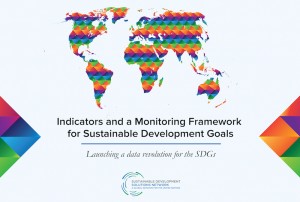 of the Sustainable Development Solutions Network – SDSN .
of the Sustainable Development Solutions Network – SDSN .
We follow Informal interactive hearings with representatives of NGOs, CSOs, major groups and the private sector on the post-2015 development agenda, in NY.
One more publication , as the outreach in Rio+20 process is 2015 Food Security Report, with key findings : – For the world as a whole, the MDG 1 indicators for prevalence of undernourishment and underweight children under 5 years of age have largely moved in parallel, providing a consistent message regarding achievement of the hunger target; – Underweight in children is expected to decline less rapidly than undernourishment, given that better hygiene conditions, access to clean water and more varied diets usually require more investment and more time to materialize than enhanced availability of calories: – Despite showing rapid reduction, Southern Asia is the region with the highest historical prevalence of underweight children among the developing regions; – In sub-Saharan Africa, there has been limited progress in reducing both undernourishment and child underweight; – Economic growth is necessary for sustaining progress in efforts to reduce poverty, hunger and malnutrition. But it is not sufficient; – Inclusive growth – growth that provides opportunities for those with meagre assets, skills and opportunities – improves the incomes and livelihoods of the poor, and is effective in the fight against hunger and malnutrition; – Improving the productivity of resources held by family farmers and smallholders is, in most cases, an essential element of inclusive growth and has broad implications for the livelihoods of the rural poor and for the rural economy in general; – In many situations, international trade openness has an important potential for improving food security and nutrition by increasing food availability and for promoting investment and growth; – Social protection directly contributes to the reduction of hunger and malnutrition by promoting income security and access to better nutrition, healthcare and education; – Prevalence of food insecurity and malnutrition is significantly higher in protracted crisis contexts resulting from conflict and natural disasters. For more information
Regional training on the process of designation of potential Natura 2000 sites
Aleksandra Mladenovic of EASD, participated as ECF ECRAN regional representative at the Regional training on the process of designation of potential Natura 2000 sites, November 4-5, 2014; Podgorica, Montenegro.
Training was very useful and interesting, experienced presenters provided quality and sufficient information and discussions were simply and informative.
The training was moderated by Mr. Petr Roth, with experts-presenters from EU: Carlos Romao, EEA; Michael Hošek, Krkonose NP, Ministry of Environment, Czech Republic; András Schmidt, Ministry for Rural Development, Hungary; Erika Stanciu, ProPark Foundation, Romania; Jasminka Radović, SINP Croatia. Specific objectives of the meeting were to provide staff of public administration and expert bodies of ECRAN beneficiary countries responsible for preparation of (future) Natura 2000 network with exhaustive information about the particular steps of its building, their logical order, data, expertise, time and funding requirements, to make them familiar with the requirements of the European Commission, and to provide them with practical examples from current EU MS. All these information have been shared and will serve as a background for preparing roadmaps for each particular country, but also for formulating their requirements for funding, personnel and time needed for accomplishing their tasks.
EU negotiation process: we are following explanatory screenings
Chapter 26: Education and Culture ( Explanatory Screening February 20, 2014 , Training for CSOs March 5, 2014 )
Chapter 25: Science and Research (Training for CSOs March 5, 2014 )
Chapter 11: Agriculture and Rural Development (Explanatory Screening, 18-20 March 2014)
Knowledge based advocacy: Environment should be within priorities in the negotiations with EU
Public Policy Institute organized on 18 February, 2014 in Belgrade the Panel discussion „Negotiations as a priority – priorities in the negotiations“.
Panelists were:
– representatives of the PPI : Prof. Nikola Samardzic, Prof. Stevan Lilić, Prof. Mijat Damjanovic, Prof. Anđelka Mihajlov, andGordana Lazarevic.
– representatives of the Government of Serbia: Dr. Tanja Miščević, Head of the Serbian negotiating team with the European Union,Nikola Selaković, Minister of Justice and Public Administration, and Lazar Krstic, Minister of Finance.
Moderator of the panel was Selena Tasic.
The important issues of priority in the negotiations were addressed, including the background information why environmental sector should be among the priorities.
Prof. Anđelka Mihajlov raised the question: If the knowledge is used as a tool and we know that one-third of the EU acquis is in environment sector, should that sector be among the priorities of European integration?
She pointed out that the answer is self-explanatory and that Chapter 27 should be among priorities. She underlined that Chapter 27 is very difficult to negotiate, among other things, because it affects the competence of many ministries with the significant responsibility of the Ministry of Finance. In addition, she pointed out that other sections of the negotiation, such as food security, rural development and agriculture, fisheries and energy, in many areas depend on the infrastructure achieved in waste management, waste water management and industrial pollution control. She also said that now it will be good to take advantage of momentum when we are because after more than ten years of “ knocking on the EU’s door, have the door opened,” and mobilize teams for each chapter.
Representative of the ENV.net project participated at this meeting.
Western Balkan Civil Society Forum
The 4th Western Balkan Civil Society Forum was organized from 26-27 November 2012, in Zagreb, Croatia.
The Western Balkan Civil Society Forum is a part of the European Economic and Social Committee (EESC) activities in the Western Balkans.
The main topics of the Forum were:
- The relations between the European Union (EU) and the countries of the region;
- How to improve media freedom and freedom of expression in the region?
- How to involve civil society organizations in the process of accession to the EU?
- What is the role for civil society organizations in rural development and employment issues?
- Possibilities for future cooperation.
This Forum is organized every two years since 2006, with the main goal to provide an opportunity to exchange views on the current situation of civil society in the region, its needs and its future development. This year the Forum brought together about 150 participants from Western Balkan countries, the EESC members, EU institutions representatives, NGOs, and diplomats.
On behalf of the Environmental Ambassadors for Sustainable Development, our representative was Natasa Zugic-Drakulic.
Summer Eco-School
“Environmental Ambassadors for Sustainable Development”, in cooperation with City of Sombor administration – Department of Public Services and Utilities organised Summer Eco-School in UNESCO Biosphere Reservate Golija (MAB – UNESCO) – Studenica (27-31 August 2012). Participated students from Sombor attending different faculties. Lectures and educative workshops include concept of protection of natural and cultural heritage within biosphere reservate, biodiversity and sustainable use of plant resources, Sustainable tourism and possibilities for development of rural areas, Ecological footprint, as well as walking tours (“Learning by Walking”). Ecological footprint is developed through support by UNESCO, and represents educational signal and courses.
Environmental Education for students from Sombor
“Environmental Ambassadors for Sustainable Development”, in cooperation with City of Sombor administration – Department of Public Services and Utilities organised Summer Eco-School “2012 Golija Summer Eco-School” in UNESCO Biosphere Reservate Golija – Studenica (27-31 August 2012). Participated students from Sombor atending diferent faculties. Lectures and educative workshops include concept of protection of natural and cultural heratage within biosphere reservate, biodiversity and sustainable use of plant resources, Sustainable tourism and possibilities for development of rural areas, Ecologycal footprint, as well as walking tours (“Learning by Walking”).
In December 2013, 3 workshops were held for preschool children in Sombor.
Western Balkan Civil Society Forum
The 4th Western Balkan Civil Society Forum was organized from 26-27 November 2012, in Zagreb, Croatia, as the event promoting regional cooperation.
The Western Balkan Civil Society Forum is a part of the European Economic and Social Committee (EESC) activities in the Western Balkans.
The main topics of the Forum were:
- The relations between the European Union (EU) and the countries of the region;
- How to improve media freedom and freedom of expression in the region?
- How to involve civil society organizations in the process of accession to the EU?
- What is the role for civil society organizations in rural development and employment issues?
- Possibilities for future cooperation.
This Forum is organized every two years since 2006, with the main goal to provide an opportunity to exchange views on the current situation of civil society in the region, its needs and its future development. This year the Forum brought together about 150 participants from Western Balkan countries, the EESC members, EU institutions representatives, NGOs, and diplomats.
Our representative was Natasa Zugic-Drakulic.
Projects 2004-2011
- Sustainable Development and Environment towards EU: “EnE – Environment to Europe” Conferences 2005, 2006, 2007, 2008, 2009, 2010, 2011, in cooperation with Serbian Chamber of Commerce
- E-communication standards , 2011, supported by Ministry of Environment and Spatial Planning
- “Support to the Department of Planning, Programming, Monitoring and Reporting on EU Funds and development assistance to the Office for European Integration of Serbia, for establishing a partnership to promote the use of international assistance “, participant as the member of leading SEKO Consortium for Environment and Energy, 2011 ,
- Ecological footprint: analysis and training, project supported by UNESCO, 2011
- Possible aspects of environmental protection and natural resource management for Rural Development, supported as advisory project in the “Project on Transitional Agriculture Reform,” World Bank , 2011, 2011/2012, the Ministry of Agriculture, Forestry and Water Management of the Republic of Serbia
- Environment Forum , project supported by EC (DG Environment)
- Analytical study of the impact of air pollution on the population in selected urban locations (Pancevo, Vrsac, Bor), (participation in the project with the questioning of citizens in selected locations on the subject), a project supported by the ministries responsible for the environment and for science
- Hazardous Waste Management, TAIEX DG Enlargement INFRA 32384 project, 2009
- Say Yes to Palilula , project supported by City of Belgrade Municipality Palilula
- Modify habits – keep Belgrade clean!, the project supported by the Secretariat of Environment of Belgrade
- Hit the right tone by use environmentally friendly rules , project supported by City of Belgrade Municipality Vracar
- Regional environmental advocacy and cohesion of the Western Balkans (abbreviation: REA), Project supported by the Embassy of Nederland (2009-2011) , REA Project Snapshots , Courses
- Children – the guardians of municipality, project supported by City of Belgrade Municipality Vozdovac
- Local Environmental Security (abbreviation: LES), project supported by OSCE in Serbia, LES Brochure
- Keep it healthy, keep it green, keep it European , project supported by NDI
- Involvement of NGOs in Serbia in the research of renewable energy sources, a project supported by the EU
- My Belgrade – My Environment , the project supported by the Secretariat of Environment of Belgrade
- Local strategic planning , project supported by City of Belgrade Municipality Stari Grad
- Technology Transfer Partnerships, project supported by CIDA
- Sustainable development and environmental leaders for tomorrow, 2006/2007, MATRA
- Building a common ‘green’ future in Europe (Regional Initiative for cohesion in the field of environment), project supported by Open society Fund
- RENCO – Regional Environmental Cohesion: Towards sustainable development strategy for urban South-East Europe, project supported by Sida and Ministry of Environment
- Women as the Voice for Sustainable Development and Environment , project supported by CIDA, WAVE_Report_2007-draft
- Education courses for provincial and local authorities on public participation in decision-making related to the Environmental Impact Assessment and Strategic Impact Assessment , Project supported by Ministry of Environment

